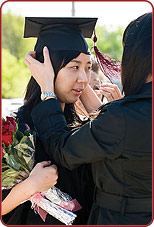A Liberal Arts Degree and Today’s Job Market
In a difficult economy, many students and parents are thinking about the best ways to put a UW–Madison degree to use in today’s job market, and which majors or programs might be the most marketable during a recession.

In May 2008, 6,100 students earned bachelor’s degrees at UW–Madison, in more than 137 majors.
“We sometimes have concerned parents asking what students are ‘qualified for’ with a liberal arts degree, and whether or not their students will be employable once they graduate, especially given the challenging economic climate,” says Patti Lux-Weber, Parent Program coordinator.
Campus experts urge students to find an area of study that is a good fit as a pathway to a satisfying career.
While it may seem that choosing the “right” major is key to getting a good job, long-term professional success will be influenced by acquiring the right skills for a rapidly changing workplace, says Nancy Westphal-Johnson, associate dean of Letters and Science, the university’s largest college.
Students can gain much from a liberal education, which generally is described as a course of study intended to provide general knowledge and intellectual skills in a specific area of interest, as opposed to occupational and technical skills. This approach to learning helps students become creative thinkers, allowing them to be passionate, self-motivated learners who are tolerant and globally knowledgeable. Students with a liberal education are not limited by specialization, but are adaptable to change and open to new opportunities.
Westphal-Johnson notes that some parents instinctively advise their students to go into traditionally safe and secure fields. But the current economy has shown that few sectors are immune to cuts, and that it is equally useful for students to acquire life skills, regardless of major.
For example, few history majors ultimately work as historians. But they do become proficient in writing, research, and reasoning, along with developing an understanding of and appreciation for diversity. This makes then well suited for the 21st-century economy. It is important for students, regardless of major, to acquire good communication skills and gain professional experience prior to graduation.
The American Association of Colleges and Universities (AACU) recently surveyed employers about what traits they look for the most as they recruit for new employees. These traits include being able to:
- Work well in teams—especially in diverse situations
- Understand science and technology and how these subjects are used in real-world settings
- Write and speak well
- Think clearly about complex problems
- Analyze a problem to develop workable solutions
- Understand the global context in which work is now done
- Be creative and innovative in solving problems
- Apply knowledge and skills in new settings
- Understand numbers and statistics through analytical reasoning
- Demonstrate a strong sense of ethics and integrity
Specifically, employers look for potential hires who have “gained critical thinking and analytical skills, the ability to apply knowledge to new situations, the ability to work with others from a wide range of backgrounds, and knowledge about the world in general,” says Aaron Brower, UW–Madison’s vice provost for teaching and learning.
Brower recalls learning from one employer that he first looks at the grades of a UW–Madison student to determine that the student was academically successful during college, but with further review pays close attention to the details of what the student accomplished while in school. Accomplishments may include internships, study abroad, service, research, and leadership activities, as they are a testament to the student’s ability to apply the knowledge they have acquired.
“A degree from UW–Madison seems to be the litmus test for indicating that the candidate is qualified, but other experiences are clearly valued as well,” Brower adds. He encourages students, regardless of major and field, to seek out those out-of-classroom experiences that allow them to become active learners.
The Letters & Science Career Services is a great resource for students with questions about majors and employment. L&S Career Services offers skill assessments, podcasts, e-recruiting, preparation for interviews, current information about the job market and the economy, and more. To learn more about their services, visit the Student Academic Affairs Web site or call 608-262-3921. Students who are interested in exploring different majors and career options should contact the Exploration Center. The Exploration Center offers individual appointments with professional career advisors, workshops, standardized career assessments including the MBTI and the Campbell Interest and Skill Survey (CISS), computerized career guidance, a career library of over five hundred books, and more. For more information visit the Exploration Center Web site, or call 608-265-4497.
